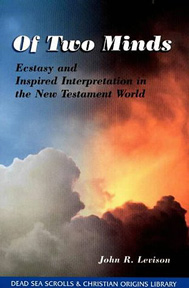Multimedia • Reference • Religion • Travel |
 Of Two Minds: Ecstasy and Inspired Interpretation in the New Testament World Dead Sea Scrolls and Christian Origins Library Volume 1 John R. Levison
Description From The Publisher: How does the spirit work through prophets? Early Jewish writers were themselves of two minds on this question. One answer-the "first mind"-was that the prophet is overcome by the spirit and becomes unconscious in the spirit's presence. The words are delivered not by the prophet, who is entirely unaware of them, but by the spirit. This concept, called "inspired ecstasy" was actually more at home at the oracle of Delphi in Greece than in Israel. Yet Jewish authors carefully and creatively imported the concept into the Bible. The "second mind" is that of the inspired interpreter, a mind whose acuity is heightened by the presence of the spirit so that the prophet is able to interpret more clearly that which he or she sees. This concept can be clearly seen in the work of several biblical authors who recognized the divine spirit as the source of an inspired interpretation of Scripture. From ancient Babylon to the present day, many have understood the work of the spirit in one of these two terms, either through the careful exegesis of the trained scholar or through the inspired speech of a spirit-possessed person. Yet, as Levison shows, not only are both of these concepts biblically based, they are but two expressions of a biblical concept of a spirit which is unbounded by nature or geography and which has no limits on the way it can work. Reader's Index Send us your favorite quotes or passages from this book. About the Author John R. Levison is Associate Professor of the Practice of Biblical Interpretation at The Divinity School, Duke University. He earned a B.A. from Wheaton College, an M. A. from Cambridge University and a Ph.D. from Duke University. He has also studied at the University of Tübingen in Germany, Yeshiva University and the University of St. Andrews in Scotland. He has published numerous articles and four other books: The Spirit in First Century Jewish Exegesis (Brill 1999), Jospehus’ Contra Apionem (Brill, 1996), Jesus in Global Contexts (with Priscilla Pope-Levison, Westminster/John Knox, 1992), and Portraits of Adam in Early Judaism (JSOT Press, 1988). He has taught at North Park College and Theological Seminary, Saint Paul School of Theology, St. Mary’s College of the University of St. Andrews, and Ohio Northern University. He is the co-chair of the Divine Mediator Figures in Antiquity group of the National Society of Biblical Literature, a contributing reviewer for Old Testament Abstracts, an assistant editor for the Journal for the Study of the Pseudepigrapha Supplement Series, and a past consultant to the National Council of Churches on Jewish and Christian relations. Table of Contents
Customer Reviews Write your own online review. Look for Similar Books by Subject | ||||||||||
Copyright ©1996-2005 CenturyOne Bookstore. All Rights Reserved. All prices subject to change and given in U.S. dollars. Your purchase from CenturyOne.com will assist the CenturyOne Foundation in providing funding for various archaeological and research projects which seek to provide more information about the period of the First Century C.E., the origins of Christianity and the world of the Bible in general. All materials contained in http://www.centuryone.com are protected by copyright and trademark laws and may not be used for any purpose whatsoever other than private, non-commercial viewing purposes. Derivative works and other unauthorized copying or use of stills, video footage, text or graphics is expressly prohibited. |

